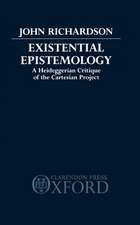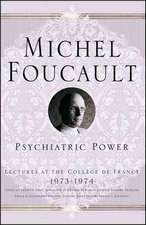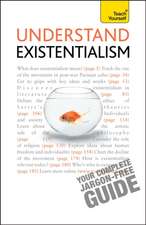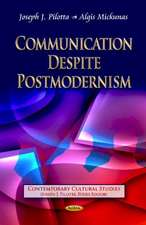Language and Being: Heidegger's Linguistics: Bloomsbury Studies in Continental Philosophy
Autor Duane Williamsen Limba Engleză Paperback – 20 mar 2019
| Toate formatele și edițiile | Preț | Express |
|---|---|---|
| Paperback (1) | 230.51 lei 6-8 săpt. | |
| Bloomsbury Publishing – 20 mar 2019 | 230.51 lei 6-8 săpt. | |
| Hardback (1) | 715.00 lei 6-8 săpt. | |
| Bloomsbury Publishing – 20 sep 2017 | 715.00 lei 6-8 săpt. |
Din seria Bloomsbury Studies in Continental Philosophy
- 14%
 Preț: 179.26 lei
Preț: 179.26 lei - 23%
 Preț: 179.10 lei
Preț: 179.10 lei - 13%
 Preț: 238.22 lei
Preț: 238.22 lei - 31%
 Preț: 772.98 lei
Preț: 772.98 lei - 30%
 Preț: 773.39 lei
Preț: 773.39 lei - 14%
 Preț: 888.65 lei
Preț: 888.65 lei - 22%
 Preț: 772.98 lei
Preț: 772.98 lei - 13%
 Preț: 258.33 lei
Preț: 258.33 lei - 23%
 Preț: 256.02 lei
Preț: 256.02 lei - 30%
 Preț: 715.00 lei
Preț: 715.00 lei -
 Preț: 255.66 lei
Preț: 255.66 lei - 22%
 Preț: 773.06 lei
Preț: 773.06 lei - 14%
 Preț: 891.10 lei
Preț: 891.10 lei - 30%
 Preț: 774.20 lei
Preț: 774.20 lei - 13%
 Preț: 257.97 lei
Preț: 257.97 lei - 30%
 Preț: 715.00 lei
Preț: 715.00 lei - 22%
 Preț: 774.62 lei
Preț: 774.62 lei - 13%
 Preț: 256.20 lei
Preț: 256.20 lei -
 Preț: 256.59 lei
Preț: 256.59 lei - 22%
 Preț: 257.50 lei
Preț: 257.50 lei - 13%
 Preț: 257.03 lei
Preț: 257.03 lei - 13%
 Preț: 257.68 lei
Preț: 257.68 lei - 13%
 Preț: 258.15 lei
Preț: 258.15 lei - 30%
 Preț: 715.19 lei
Preț: 715.19 lei - 13%
 Preț: 256.49 lei
Preț: 256.49 lei - 22%
 Preț: 891.10 lei
Preț: 891.10 lei -
 Preț: 255.94 lei
Preț: 255.94 lei - 13%
 Preț: 236.45 lei
Preț: 236.45 lei - 30%
 Preț: 714.92 lei
Preț: 714.92 lei - 30%
 Preț: 773.81 lei
Preț: 773.81 lei - 22%
 Preț: 772.98 lei
Preț: 772.98 lei - 22%
 Preț: 889.08 lei
Preț: 889.08 lei - 30%
 Preț: 714.61 lei
Preț: 714.61 lei -
 Preț: 256.59 lei
Preț: 256.59 lei - 14%
 Preț: 772.98 lei
Preț: 772.98 lei - 22%
 Preț: 257.68 lei
Preț: 257.68 lei - 22%
 Preț: 891.75 lei
Preț: 891.75 lei - 30%
 Preț: 773.81 lei
Preț: 773.81 lei
Preț: 230.51 lei
Preț vechi: 296.94 lei
-22% Nou
Puncte Express: 346
Preț estimativ în valută:
44.12€ • 47.94$ • 37.09£
44.12€ • 47.94$ • 37.09£
Carte tipărită la comandă
Livrare economică 21 aprilie-05 mai
Preluare comenzi: 021 569.72.76
Specificații
ISBN-13: 9781350105713
ISBN-10: 1350105716
Pagini: 224
Dimensiuni: 156 x 234 x 16 mm
Greutate: 0.33 kg
Editura: Bloomsbury Publishing
Colecția Bloomsbury Academic
Seria Bloomsbury Studies in Continental Philosophy
Locul publicării:London, United Kingdom
ISBN-10: 1350105716
Pagini: 224
Dimensiuni: 156 x 234 x 16 mm
Greutate: 0.33 kg
Editura: Bloomsbury Publishing
Colecția Bloomsbury Academic
Seria Bloomsbury Studies in Continental Philosophy
Locul publicării:London, United Kingdom
Caracteristici
Heidegger's thought offers a provoking and persuasive alternative to conventional linguistic philosophy
Notă biografică
Duane Williams teaches and researches in the Theology, Philosophy and Religious Studies Department at Liverpool Hope University. His first book, The Linguistic Christ was published in 2011. He is the editor of Medieval Mystical Theology: The Journal of the Eckhart Society, and co-facilitator of the Association for Continental Philosophy of Religion.
Cuprins
IntroductionInterpreting HeideggerHeidegger's ApproachHeidegger and LanguageMystical HeideggerHeidegger and the LogosStructure and ScopeChapter 1. The Forgetting Of Being1. 1. The Fundamental Question1. 2. Ontotheology1. 3. The Isness of Being1. 4. The Ontological Difference Chapter 2. The Attunement Of Language To Being2. 1. The Whatness of What2. 2. Co-respondence2. 3. A Linguistic ConcernChapter 3. Language Devalued3. 1. Language as Logical Assertion3. 2. Language as Interpretive Discourse3. 3. Language as Idle Talk3. 4. Curiosity and DuplicityChapter 4. Homelessness And The House Of Being4. 1. Language as Sign System4. 2. The Architectonic Structure of Language4. 3. Two Theories of Language4. 4. The Conventional View of Language4. 5. Language as the House of BeingChapter 5. In The Beginning Was The Word5. 1. Manifestation or Creation?5. 2. The Law of Mediacy5. 3. The Irruption of Poiesis5. 4. Poetry as Linguistic WorkChapter 6. The Flower Of The Mouth6. 1. Alethia and Lichtung6. 2. Koto Ba that Names Iki6. 3. Language as SayingChapter 7. The Dif-ference That Tears And Bears7. 1. A Division in the Middle7. 2. The Striving-Strife of the Rift-Design7. 3. The Pain of the Threshold's Joining7. 4. Language Speaks as the Peal of StillnessChapter 8. Language As It Gives And Not It Is8. 1. The Nothing Noths8. 2. Presence in Absence8. 3. The LeitsatzChapter 9. The Way To Language9. 1. Bringing Language As Language To Language9. 2. The Way-Making Movement9. 3. Seeking the Prize so Rich and FrailChapter 10. The Showing Of Saying As Owning-Event10. 1. Propriation10. 2. The Essence of Man10. 3. An Apparent Contradiction10. 4. Saying the Same with the LogosChapter 11. Language Alone Speaks11. 1. Etymology11. 2. The Peculiarity of Language11. 3. Language is LanguageChapter 12. The Sayers Who More Sayingly Say12. 1. The Destitute Time12. 2. The Closing of the Open12. 3. The Conversion of Consciousness12. 4. More Daring by a Breath12. 5. Poetically Man DwellsConclusionBibliography
Recenzii
One of the virtues of this study is its direct and accessible style . [It] offers a helpful interpretation of the relation of language and Being in Heidegger's thought, and can be recommended as providing a courageous effort to grapple with an immensely difficult topic.
Duane Williams' new book is a further sign that Heidegger scholarship in Britain is alive and well. In this sustained and intensely focused exposition of what Heidegger can teach us about language Williams not only helps Heidegger beginners and sceptics to see that something important is going on in these texts, but also offers new insight to established Heidegger readers. Williams is especially attentive to the proximity of Heideggerian thinking to mystical and East Asian thought as well as to its poetic dimension. He shows how Heidegger can assist us in reflecting on human beings' spiritual needs in a time threatened by the seemingly unstoppable reduction of communication to information, management-speak, and data.
Duane Williams' new book is a further sign that Heidegger scholarship in Britain is alive and well. In this sustained and intensely focused exposition of what Heidegger can teach us about language Williams not only helps Heidegger beginners and sceptics to see that something important is going on in these texts, but also offers new insight to established Heidegger readers. Williams is especially attentive to the proximity of Heideggerian thinking to mystical and East Asian thought as well as to its poetic dimension. He shows how Heidegger can assist us in reflecting on human beings' spiritual needs in a time threatened by the seemingly unstoppable reduction of communication to information, management-speak, and data.

















